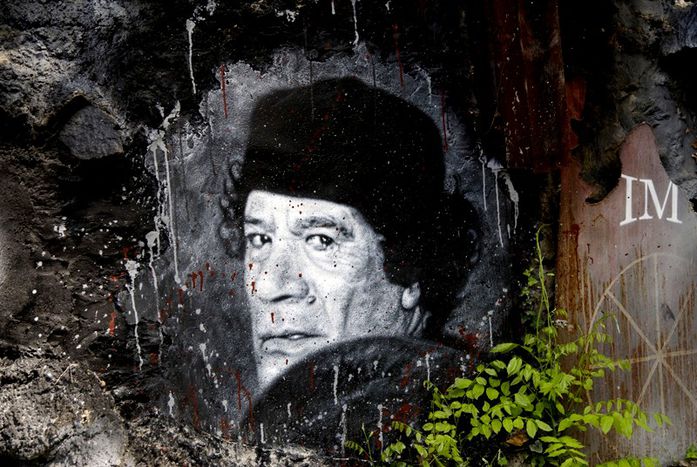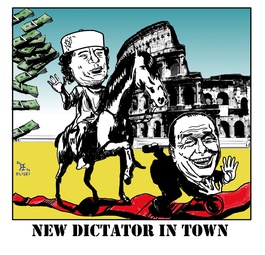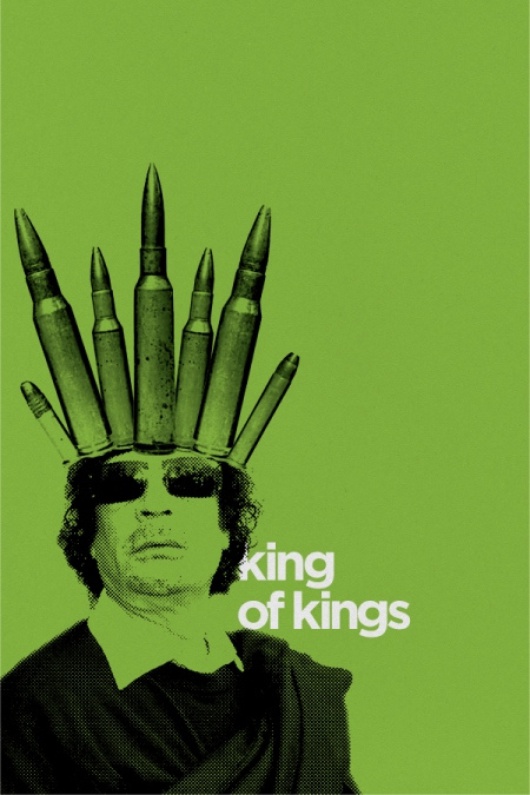
Gaddafi and Europe: it was nice while it lasted, wasn't it?
Published on
Translation by:
 hkeet
hkeet
The EU member states have benefited from the subsoil and the strategic position of the oldest dictatorship in Africa and the Middle East so much so that they find it difficult to say a bad word against their former ally. The Europeans are served joyfully around Colonel Gaddafi's table of the kingdom
Even so, Muammar al-Gaddafi is the 'king of the traditional kings of Africa'. Black sunglasses, haughty; bit by bit he has traded his revolutionary sole, which was inspired by Nasser, the second president of Egypt, in favour of a new style: boasting. Until now, he boasted so much so that people started to say that he was the key man of the Middle East for us Europeans. He had delusions of grandeur no matter where he was: in Paris in December 2007 he had his Bedouin tent pitched in the gardens of the Hotel Marigny without a second thought. During the same year, he visited the Spanish authorities with an entourage of three hundred, including his female bodyguards. He had his 'jaima' tent set up in the royal palace of el pardo near Madrid, which was once the residence of former Spanish dictator Francisco Franco.
Gaddafi's flamboyant 'European reintegration'
 In France, Rama Yade, former human rights secretary of state, had condemned his 10 December visit; it also coincided with international human rights day. She emphasised that 'France should not receive this kiss of death.' French prime minister François Fillon condemned the 'preachers' because Gaddafi was in the process of 'reintegrating into the international community.' One week later, Gaddafi's 'reintegration' continued by touring Spain. The visit consisted of one luxury visit to Seville before a stop in Malaga for the tasting of dishes by Ferrán Adriá, the best chef in the world. In Rome in August 2010, his traditional 'jaima' tent sat enthroned in the gardens of the Libyan embassy and five hundred young women, who were recruited for their physical appearance amongst other things, had come to hear him debate about converting Europeans to Islam. But why were the Europeans so calm with the man Ronald Reagan called the 'mad dog of the Middle East' in 1986?
In France, Rama Yade, former human rights secretary of state, had condemned his 10 December visit; it also coincided with international human rights day. She emphasised that 'France should not receive this kiss of death.' French prime minister François Fillon condemned the 'preachers' because Gaddafi was in the process of 'reintegrating into the international community.' One week later, Gaddafi's 'reintegration' continued by touring Spain. The visit consisted of one luxury visit to Seville before a stop in Malaga for the tasting of dishes by Ferrán Adriá, the best chef in the world. In Rome in August 2010, his traditional 'jaima' tent sat enthroned in the gardens of the Libyan embassy and five hundred young women, who were recruited for their physical appearance amongst other things, had come to hear him debate about converting Europeans to Islam. But why were the Europeans so calm with the man Ronald Reagan called the 'mad dog of the Middle East' in 1986?
Libya is the number one supplier of hydrocarbon to Italy since the treaty on friendship, partnership and co-operation was signed by the two countries in August 2008 in Benghazi. Sara Prestianni, co-ordinator of the Migreurop network which brings together forty-two associations in Europe, explains that this agreement is made of three parts. The first is the limitation of illegal immigration. The second is repairing the damage caused by Italy colonising Libya, realised by an investment of five billion dollars in Libyan infrastructure by Italian businesses over a period of three years. The third section talks of an economic partnership: Gaddafi became the first shareholder of Unicredit and took 1% of ENI's share. ENI is the biggest hydrocarbon company in Italy and the fifth largest worldwide. In return, this company amongst others was established in Libya.
However, other countries were not to be outdone: on the infamous 10 December 2007, shortly after the liberation of Bulgarian nurses, the French president declared that 'France will sign collaboration contracts for a desalination plant for sea water with a nuclear reactor, for co-operation in armament and other economic contracts.' This 'reintegration' was seen as a godsend. The Spanish company Repsol invested €38.03 million in Libya between 2006 and 2009. But from the second day of the popular protests, caused by remorse which has been building up for a long time by this point, the firm decided to suspend all activities in the country, following the example of other European petrol companies. The same goes for Germany. Without doubt, Libya possesses oil reserves estimated at 40 billion barrels and gas amounting to 1, 500 billion. German companies, like the rest of the world, are tracking down new oil deposits. After the end of the EU embargo against Libya in 2004, former German chancellor Gerhard Schröder unveiled a Libyan oil deposit for the Wintershall company, a subsidiary of the BASF giant.
Human rights muted
 What about human rights in all of this? Sara Prestianni highlights that the Libyan leader was committed to carrying out border controls for drugs, illegal immigration and terrorism. Very soon after, the influx of illegal immigrants entering Lampedusa dropped, which says a lot about the close ties kept with the organisers of these 'trips'. Italy also 'drives out' migrants who wish to arrive on their shores by expelling them to Libya. 'Although it is banned by international rights, Libya has accepted these migrants who were forced back at the port in Tripoli. Italy turned a blind eye to the arbitrary arrests, the fact that immigrants were forced back to the middle of the desert, and the detention centres that Migreurop has been condemning for years.' However, the Benghazi treaty 'refers to respecting the UN charter and the universal declaration of human rights,' remarks Giuliano Luongo, Italian economist at the university of Naples Federico II.
What about human rights in all of this? Sara Prestianni highlights that the Libyan leader was committed to carrying out border controls for drugs, illegal immigration and terrorism. Very soon after, the influx of illegal immigrants entering Lampedusa dropped, which says a lot about the close ties kept with the organisers of these 'trips'. Italy also 'drives out' migrants who wish to arrive on their shores by expelling them to Libya. 'Although it is banned by international rights, Libya has accepted these migrants who were forced back at the port in Tripoli. Italy turned a blind eye to the arbitrary arrests, the fact that immigrants were forced back to the middle of the desert, and the detention centres that Migreurop has been condemning for years.' However, the Benghazi treaty 'refers to respecting the UN charter and the universal declaration of human rights,' remarks Giuliano Luongo, Italian economist at the university of Naples Federico II.
This is a regime which infringes on human rights. It has been long condemned by NGOs, especially each time a dictator decides to hold a 'reintegration' visit to a European country. Libya's law 71, which bans any independent political activity and for which 'offenders are punishable by the death penalty', had been pointed out to the French government by the human rights watch (HRW) NGO. Would European leaders dare to say today that they were not aware of the symptoms of the dictatorship which is now conveyed as a cruel and blind repression? The international community, which gave Libya the presidency of the UN human rights commission in 2003, then elected it to the human rights council in May 2010, was not fooled. It was simply interested in playing the Bedouin King's game.
Is it game over? 'How long is the EU's migratory policy going to depend on the dictatorships south of the Mediterranean?' Migreurop demanded in its last statement. 'The European authorities were continuing to negotiate, less than a week ago, for Libya's participation in their policy on cordoning off the Mediterranean region,' it states. The EU urgently needs to 'disintegrate' the open diplomacy with dictatorships.
Images: main (cc) Abode of Chaos/ Flickr; Gaddafi and Berlusconi ©Francesco Elisei; King of kings (cc)Crethi Plethi/ Flickr
Translated from Kadhafi et l’Europe : c’était quand même bien non ?


